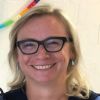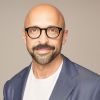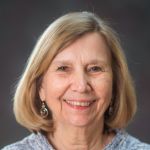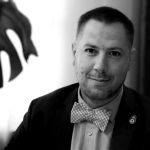OS Fair 2025 - Programme
-
Day 1
DAY 1 | Monday | Science Gateway15 SeptemberMondayScience Gateway, Globe of Science and Innovation
10:30 - 12:30CERN Guided Tours for early arrivals
The Synchrocyclotron, the ATLAS Visitor Center, the Antimatter Factory and the CERN Data Center
12:00Registration
Science Gateway AuditoriumWelcome Lunch
Globe of Science and Innovation - Ground & 1st floor
14:00Conference Opening: Introductory Remarks
Science Gateway - Auditorium AFrom the PC chairsInge Van Nieuwerburgh, OpenAIRE - Chair of the Executive Board Inge Van Nieuwerburgh works in the Open Science team of Ghent University Library. She has been involved in Open Science and scholarly communications activities since she started to work at Ghent University library in 2004. She holds a Master in Germanic philology Dutch/English) from Ghent Universit…Kamran Naim, CERN - Head of Open Science
Inge Van Nieuwerburgh works in the Open Science team of Ghent University Library. She has been involved in Open Science and scholarly communications activities since she started to work at Ghent University library in 2004. She holds a Master in Germanic philology Dutch/English) from Ghent Universit…Kamran Naim, CERN - Head of Open Science Dr. Kamran Naim is the Head of Open Science at the European Organization for Nuclear Research (CERN), where he leads a diverse portfolio of activities that aim to accelerate global open science practice. This includes organizational policy development (facilitating the development of CERN’s Open Data and Open Science Policies); organizing and conv…
Dr. Kamran Naim is the Head of Open Science at the European Organization for Nuclear Research (CERN), where he leads a diverse portfolio of activities that aim to accelerate global open science practice. This includes organizational policy development (facilitating the development of CERN’s Open Data and Open Science Policies); organizing and conv…
14:15Opening KeynoteScience Gateway - Auditorium ADr. Alexa T. McCray,
Professor of Medicine at Harvard Medical School and the Department of Medicine, Beth Israel Deaconess Medical Center Dr. Alexa T. McCray is Professor of Medicine at Harvard Medical School and the Department of Medicine, Beth Israel Deaconess Medical Center. She is the former director of the Lister Hill National Center for Biomedical Communications, an intramural research division of the U.S. National Institutes of Health (NIH). Before joining the NIH, she was on the research staff of IBM’s T.J. Watson Research Center. She received the PhD from Georgetown University and conducted pre-doctoral research at the Massachusetts Institute of Technology. Dr. McCray conducts research in biomedical informatics, particularly as it relates to the curation and dissemination of scientific and clinical data. While at the NIH, she directed the design and development of a number of openly available information resources, including ClinicalTrials.gov, an international database of clinical research studies and results. At Harvard, she most recently was a leader of the NIH-supported U.S.-wide Undiagnosed Diseases Network, a research program that seeks to provide answers for patients and families affected by rare and undiagnosed conditions. Dr. McCray is an elected member of the U.S. National Academy of Medicine, a fellow of the American Association for the Advancement of Science, the American College of Medical Informatics, and the International Academy of Health Sciences Informatics. She is past chair of the U.S. National Academies of Sciences, Engineering, and Medicine’s (NASEM) Board on Research Data and Information. She chaired a 2018 NASEM consensus study entitled Open Science by Design: Realizing a Vision for 21st Century Research and recently chaired a Harvard Medical School faculty committee concerned with rigor, reproducibility and responsibility in research.
Dr. Alexa T. McCray is Professor of Medicine at Harvard Medical School and the Department of Medicine, Beth Israel Deaconess Medical Center. She is the former director of the Lister Hill National Center for Biomedical Communications, an intramural research division of the U.S. National Institutes of Health (NIH). Before joining the NIH, she was on the research staff of IBM’s T.J. Watson Research Center. She received the PhD from Georgetown University and conducted pre-doctoral research at the Massachusetts Institute of Technology. Dr. McCray conducts research in biomedical informatics, particularly as it relates to the curation and dissemination of scientific and clinical data. While at the NIH, she directed the design and development of a number of openly available information resources, including ClinicalTrials.gov, an international database of clinical research studies and results. At Harvard, she most recently was a leader of the NIH-supported U.S.-wide Undiagnosed Diseases Network, a research program that seeks to provide answers for patients and families affected by rare and undiagnosed conditions. Dr. McCray is an elected member of the U.S. National Academy of Medicine, a fellow of the American Association for the Advancement of Science, the American College of Medical Informatics, and the International Academy of Health Sciences Informatics. She is past chair of the U.S. National Academies of Sciences, Engineering, and Medicine’s (NASEM) Board on Research Data and Information. She chaired a 2018 NASEM consensus study entitled Open Science by Design: Realizing a Vision for 21st Century Research and recently chaired a Harvard Medical School faculty committee concerned with rigor, reproducibility and responsibility in research.
15:00Science Gateway Invited Panel
Science Gateway - Auditorium APolicies and PoliticsShaping the Future: The Policy Landscape of Open Science
What’s driving Open Science forward, and what’s holding it back? This invited panel brings together policy experts to unpack the major shifts, challenges, and opportunities shaping Open Science today. Join us for a lively discussion on aligning agendas, empowering institutions, and ensuring that Open Science policies are equitable, inclusive, and globally impactful.
This invited panel will be a forum to discuss the current policy landscape for Open Science. After a short introduction of the panelists and their involvement in open science, we hope to create a dynamic and engaging session around the following topics.
Key topics of this panel session will include:
- What are the major policy shifts currently driving (or hindering) Open Science implementation?
- How can national and international policy agendas better align to support a cohesive Open Science landscape?
- What roles do public institutions, funders, and governments play in fostering openness and collaboration in research?
- How can we ensure that Open Science policies are equitable, inclusive, and globally relevant?
Panelists
-
Dejan Dvorsek,European Commission
-
Dina Petranovic,Technical University of Denmark
-
Felix Reda,GitHub
-
Yusuf Baran,Rector, Izmir Institute of Technology
Moderator
-
Bregt Saenen,Science Europe
16:00Coffee Break
Globe of Science and Innovation - Ground & 1st floor
16.45Invited Panel
Science Gateway - Auditorium AOpen Research Europe
Panelists
-
Alex Kohls,European Organization for Nuclear Research (CERN)
-
Juan Pablo Alperin,
-
Katharina Rieck,Austrian Science Fund (FWF)
-
Victoria Tsoukala,European Commission
Moderator
-
Pierre Mounier,OPERAS
17:45One-Minute Madness: Poster & Demo Pitches + Organisational Remarks
Science Gateway - Auditorium A
18.30Poster & Demo Session
Globe of Science and Innovation - Ground & 1st floor18:30 - 20:00Welcome Reception
Globe of Science and Innovation - Ground & 1st floor18:30 - 21:00
21:00End of Day 1
-
Day 2
DAY 2 | Tuesday | Science Gateway16 SeptemberTuesdayScience Gateway, Globe of Science and Innovation
9.00Invited Panel
Science Gateway - Auditorium AImpact and MonitoringTracking the Impact of Open Science: Are We Measuring What Matters?
This panel brings together experts to explore how we assess the real-world effects of Open Science. What metrics reflect meaningful change? How can we monitor progress without losing sight of equity and inclusivity? Join us for a lively discussion on tools, frameworks, and lessons shaping the future of Open Science impact and monitoring.
This invited panel will be a forum to discuss the current landscape of Impact and Monitoring of Open Science. After a short introduction of the panellists and their involvement in open science, we hope to create a dynamic and engaging session around the following questions:
- How can we effectively measure the impact of Open Science on research practices and outcomes?
- What tools and metrics are needed to monitor the progress of Open Science initiatives at national, regional, and global levels?
- How do we ensure that the monitoring frameworks align with the core values of openness, equity, and inclusivity?
- What lessons can we learn from past and current Open Science implementations to improve future monitoring efforts?
Panelists
-
Ana Persic,Scientific and Cultural Organization (UNESCO)
-
Kristi Holmes,Northwestern University
-
Roberto di Cosmo,Software Heritage Foundation
-
Susan Reilly,Maynooth University
-
Zoé Ancion,Agence Nationale de la Recherche
Moderator
10:00Conference Photograph
Science Gateway Auditorium
10:15Coffee Break
Globe of Science and Innovation - Ground & 1st floor+Demo Parallel Presentations
Globe of Science and Innovation - Ground floor
11:00Parallel Session 1
Track: Building the Digital Backbone: Open Science Infrastructures
Individual PresentationsScience Gateway - Auditorium ATrack: Beyond Compliance: Measuring and Maximizing Open Science Impact
Individual PresentationsScience Gateway - Auditorium BTrack: Open Science for All: Skills & Community
PanelScience Gateway - Auditorium CTrack: Building the Digital Backbone: Open Science Infrastructures
WorskhopScience Gateway - Education Lab A
12.30Lunch
Globe of Science and Innovation - Ground & 1st floor
14.00Parallel Session 2
Track: Building the Digital Backbone: Open Science Infrastructures
PanelScience Gateway - Auditorium ATrack: Beyond Compliance: Measuring and Maximizing Open Science Impact
Individual PresentationsScience Gateway - Auditorium BTrack: Open Science for All: Skills & Community
Individual PresentationsScience Gateway - Auditorium CTrack: Building the Digital Backbone: Open Science Infrastructures
WorskhopScience Gateway - Education Lab ATrack: Rethinking Research Assessment
WorskhopScience Gateway - Education Lab B
15:30Coffee Break
Globe of Science and Innovation - Ground & 1st floor+Demo Parallel Presentations
Globe of Science and Innovation - Ground floor
16:15Parallel Session 3
Track: Building the Digital Backbone: Open Science Infrastructures
PanelScience Gateway - Auditorium ATrack: Beyond Compliance: Measuring and Maximizing Open Science Impact
PanelScience Gateway - Auditorium BTrack: Open Science for All: Skills & Community
PanelScience Gateway - Auditorium CTrack: Building the Digital Backbone: Open Science Infrastructures
WorskhopScience Gateway - Education Lab ATrack: Rethinking Research Assessment
WorskhopScience Gateway - Education Lab B
17.45Transfer to Dinner
Trams at 17:54, 18:03, 18:12, 18:21, 18:31
19.00Conference Dinner
Hôtel des Bergues, Quai des Bergues 33, 1201 Geneva
23.00End of Day 2
-
Day 3
DAY 3 | Wednesday | Science Gateway17 SeptemberWednesdayScience Gateway, Globe of Science and Innovation
9.00Invited Panel
Science Gateway - Auditorium A
Rethinking Research Assessment: Emerging Trends in Open Science and InfrastructureReimagining Research Assessment: Open Science Values in Action
How can we build fairer, more inclusive research assessment systems? This panel explores how Open Science principles are reshaping Responsible Research Assessment, from narrative CVs to diverse outputs and responsible metrics. Join voices from CoARA, funders, researchers, and infrastructure providers as they share tools, lessons, and visions for future-ready reform.
As the global research community embraces reform in how research is assessed, emerging practices grounded in openness, transparency, and inclusivity are gaining traction. This panel will explore how new approaches to Responsible Research Assessment (RRA) are being shaped by Open Science values and supported by open infrastructures. It will bring together perspectives from policy initiatives like CoARA, open infrastructure providers, research funders, and researchers actively piloting assessment reforms.
The discussion will address the challenges and opportunities of implementing narrative CVs, assessing diverse research outputs, and integrating transparent metrics and AI responsibly. It will also highlight tools and infrastructures that enable practical implementation at the institutional and national levels. The audience will be invited to join a forward-looking conversation on what a future-proof, fair, and inclusive research assessment system could look like, and how to get there.
Panelists
-
Gitanjali Yadav,National Institute for Plant Genome Research
-
Hans de Jonge,Open Science NL
-
Pastora Martínez Samper,Universitat Oberta de Catalunya
Moderator
-
Natalia Manola,OpenAIRE
10:00Coffee Break
Globe of Science and Innovation - Ground & 1st floor
+Demo Parallel Presentations
Globe of Science and Innovation - Ground floor
10:45Parallel Session 4
Track: Building the Digital Backbone: Open Science Infrastructures
Individual PresentationsScience Gateway - Auditorium ATrack: Rethinking Research Assessment
Individual PresentationsScience Gateway - Auditorium BTrack: Open but at what Cost? Research Security & Open Science
PanelScience Gateway - Auditorium CTrack: Beyond Compliance: Measuring and Maximizing Open Science Impact
WorskhopScience Gateway - Education Lab A
12.15Lunch
Globe of Science and Innovation - Ground & 1st floor
13:45Parallel Session 5
Track: Building the Digital Backbone: Open Science Infrastructures
PanelScience Gateway - Auditorium ATrack: Rethinking Research Assessment
PanelScience Gateway - Auditorium BTrack: Open but at what Cost? Research Security & Open Science
PanelScience Gateway - Auditorium CTrack: Beyond Compliance: Measuring and Maximizing Open Science Impact
WorskhopScience Gateway - Education Lab ATrack: Open Science for All: Skills & Community
WorskhopScience Gateway - Education Lab B
15:15Coffee Break
Globe of Science and Innovation - Ground & 1st floor
+Demo Parallel Presentations
Globe of Science and Innovation - ground floor
16:00Closing Keynote
Auditorium ADr. Christopher Steven Marcum,
Senior Statistician and Senior Scientist in the Office of the Chief Statistician of the United States at the White House Office of Management and Budget Dr. Marcum is a Senior Statistician and Senior Scientist in the Office of the Chief Statistician of the United States at the White House Office of Management and Budget. His portfolio focuses on data access, science and information policy, cybersecurity, and artificial intelligence. He is the Senior Advisor to the Federal Statistical Research Data Centers and the staff lead on matters related to scientific integrity and research security. Immediately, prior to his current role, Dr. Marcum served in the Biden-Harris Administration as the Assistant Director for Open Science and Data Policy in the White House Office of Science and Technology Policy (OSTP). Dr. Marcum oversaw transformative science policies in his OSTP portfolio that led to the 2022 OSTP Public Access Memo, the 2023 Federal Scientific Integrity Framework, and the White House declaring the 2023 as a Year of Open Science. Dr. Marcum received his Ph.D. in sociology from the University of California, Irvine (UCI) in 2011. He also has a Master’s degree in demographic and social analysis from UCI and completed a post-doctoral fellowship in economics and statistics at the RAND Corporation. After his formal training, he joined the intramural research faculty of the National Human Genome Research Institute (NHGRI) at the National Institutes of Health (NIH) as a staff scientist and methodologist where his research focused on social networks and health. Eventually, he moved into science policy at the NIH and was appointed to be the Genomic Program Administrator and chair of the Data Access Committee at the National Institute of Allergy and Infectious Diseases (NIAID). His professional accolades include over fifty scientific publications, a commendation of exceptional service from OSTP, two Special Act or Service Award honors from NIAID, a Matilda White Rile Early Stage Investigator Honor from the Office of Behavioral and Social Science Research at the NIH, two GREAT Awards from the NHGRI, an Order of Merit Award from the University of California-Irvine, and two On-the-Spot Awards and an Achievement Award from the Office of Management and Budget. He is a fellow of the Gerontological Society of America, nominated by his peers for his research, training, and advocacy on issues related to aging and the life course.
Dr. Marcum is a Senior Statistician and Senior Scientist in the Office of the Chief Statistician of the United States at the White House Office of Management and Budget. His portfolio focuses on data access, science and information policy, cybersecurity, and artificial intelligence. He is the Senior Advisor to the Federal Statistical Research Data Centers and the staff lead on matters related to scientific integrity and research security. Immediately, prior to his current role, Dr. Marcum served in the Biden-Harris Administration as the Assistant Director for Open Science and Data Policy in the White House Office of Science and Technology Policy (OSTP). Dr. Marcum oversaw transformative science policies in his OSTP portfolio that led to the 2022 OSTP Public Access Memo, the 2023 Federal Scientific Integrity Framework, and the White House declaring the 2023 as a Year of Open Science. Dr. Marcum received his Ph.D. in sociology from the University of California, Irvine (UCI) in 2011. He also has a Master’s degree in demographic and social analysis from UCI and completed a post-doctoral fellowship in economics and statistics at the RAND Corporation. After his formal training, he joined the intramural research faculty of the National Human Genome Research Institute (NHGRI) at the National Institutes of Health (NIH) as a staff scientist and methodologist where his research focused on social networks and health. Eventually, he moved into science policy at the NIH and was appointed to be the Genomic Program Administrator and chair of the Data Access Committee at the National Institute of Allergy and Infectious Diseases (NIAID). His professional accolades include over fifty scientific publications, a commendation of exceptional service from OSTP, two Special Act or Service Award honors from NIAID, a Matilda White Rile Early Stage Investigator Honor from the Office of Behavioral and Social Science Research at the NIH, two GREAT Awards from the NHGRI, an Order of Merit Award from the University of California-Irvine, and two On-the-Spot Awards and an Achievement Award from the Office of Management and Budget. He is a fellow of the Gerontological Society of America, nominated by his peers for his research, training, and advocacy on issues related to aging and the life course.
16:45Wrap-up and Goodbye
Auditorium A
17:30Organisational remarks for guided tours
Auditorium A
18:00Guided Tours for late departures
Auditorium A
-